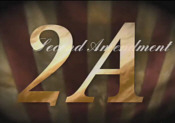

Supreme Court Ruling is About
Registration, not Crime Control
![]()
By Kurt Hofmann, June 18th 2014
JPFO writer contributor, © 2014.
 The Supreme Court ruled Monday in Abrambski v. United States that attempting to deceive federal authorities about for whom a gun purchase is being made is a serious crime, even if the actual intended recipient is perfectly eligible under all relevant laws to purchase the gun himself. The Washington Times reports:
The Supreme Court ruled Monday in Abrambski v. United States that attempting to deceive federal authorities about for whom a gun purchase is being made is a serious crime, even if the actual intended recipient is perfectly eligible under all relevant laws to purchase the gun himself. The Washington Times reports:
The Supreme Court on Monday tightened restrictions on gun purchases, ruling that the government can be strict in trying to weed out potential "straw" buyers who plan to traffic the weapons.
The 5-4 ruling, which saw court's four Democrat-appointed justices joined by Justice Anthony M. Kennedy in what was seen as the biggest test of gun rights during this term. The majority signaled their desire to strictly interpret gun laws when it comes to background checks.

Bruce Abramski
Bruce Abramski, a former police officer, represented himself as the buyer of a gun actually intended for his uncle because the gun shop offered a law enforcement discount. His uncle could have legally purchased the handgun, and indeed had to pass the federal background check, because he lived in a different state, and Abramski complied with the law requiring an interstate handgun sale to proceed through a licensed gun dealer in the recipient's home state.
 Justice Elena Kagan, writing for the majority, argues that this is still a serious crime, and her reasoning will probably raise gun rights advocates' eyebrows, and perhaps our hackles, as well:
Justice Elena Kagan, writing for the majority, argues that this is still a serious crime, and her reasoning will probably raise gun rights advocates' eyebrows, and perhaps our hackles, as well:
No piece of information is more important under federal firearms law than the identity of a gun's purchaser—the person who acquires a gun as a result of a transaction with a licensed dealer.
Even when that information has nothing to do with whether or not the gun is being bought for someone ineligible for gun ownership? Apparently so. And that means that the American people have been had.
From the Gun Control Act of 1968, to the Brady Handgun Violence Prevention Act of 1993, to proposed laws to ration Constitutional rights by limiting buyers to one gun per month, etc.--every gun law, actual and proposed, ostensibly aimed at thwarting gun trafficking--is justified, we are told, because such laws stop criminals and the violently mentally ill from acquiring firearms (well, except that they don't, but that's a subject for another day).
Now, though, the mask comes off. What the government wants is a database of gun buyers--a registry, in other words--without regard to whether or not the purchaser is dangerous.
 In the two previous Supreme Court cases regarding gun laws, Heller and McDonald, widely considered "victories" for gun rights, the Court refrained from explicitly stating under what level of scrutiny gun laws must be examined in determining whether or not they are Constitutional. Still, the McDonald ruling that the right to keep and bear arms is "fundamental" seems to at least imply that strict scrutiny is indicated--the highest hurdle a law can be required to clear. The Abramski ruling would appear to have taken that off the table.
In the two previous Supreme Court cases regarding gun laws, Heller and McDonald, widely considered "victories" for gun rights, the Court refrained from explicitly stating under what level of scrutiny gun laws must be examined in determining whether or not they are Constitutional. Still, the McDonald ruling that the right to keep and bear arms is "fundamental" seems to at least imply that strict scrutiny is indicated--the highest hurdle a law can be required to clear. The Abramski ruling would appear to have taken that off the table.
The highest court in the land has effectively ruled that a law burdening exercise of the right to keep and bear arms, but serving the "compelling government interest" of controlling violent crime does not need to be "narrowly tailored" to serve that interest, and nor does it need to be the "least restrictive means" of serving that interest. So either gun laws need not meet strict scrutiny regarding their Constitutionality, or the "compelling government interest" is actually cataloging gun owners, rather than controlling violent crime.

Justice Scalia
And that may not be the worst of it. Justice Antonin Scalia noted in his dissent that according to "the majority's view, if the bureaucrats responsible for creating Form 4473 decided to ask about the buyer's favorite color, a false response would be a federal crime." A cutting remark, and not without humor, in addition to being completely true. But it speaks to a far less funny point.
In 2012, the Bureau of Alcohol, Tobacco, Firearms and Explosives added a new question to ATF Form 4473--the form that must be filled out when purchasing a firearm, and the form on which Abramski admittedly lied.  Now, every gun purchaser must answer whether or not he or she is of "Hispanic or Latino" ethnicity. As attorney and firearms law expert Evan Nappen notes, there is no real difference between that question, and a demand--backed up by federal law, and enforced with the full power of the U.S. government--that the purchaser answer whether he or she is a "Jew or Not a Jew."
Now, every gun purchaser must answer whether or not he or she is of "Hispanic or Latino" ethnicity. As attorney and firearms law expert Evan Nappen notes, there is no real difference between that question, and a demand--backed up by federal law, and enforced with the full power of the U.S. government--that the purchaser answer whether he or she is a "Jew or Not a Jew."
And now, the Supreme Court has ruled that this is just fine.
Was this information valuable to you? If so, please consider donating, becoming a member or renewing your membership, or buying a DVD, book, tee-shirt, or other gear at our JPFO store.
 A former paratrooper, Kurt Hofmann was paralyzed in a car accident in 2002. The helplessness inherent to confinement to a wheelchair prompted him to explore armed self-defense, only to discover that Illinois denies that right, inspiring him to become active in gun rights advocacy. He also writes the St. Louis Gun Rights Examiner column. Kurt Hofmann Archive.
A former paratrooper, Kurt Hofmann was paralyzed in a car accident in 2002. The helplessness inherent to confinement to a wheelchair prompted him to explore armed self-defense, only to discover that Illinois denies that right, inspiring him to become active in gun rights advocacy. He also writes the St. Louis Gun Rights Examiner column. Kurt Hofmann Archive.
![]()




































